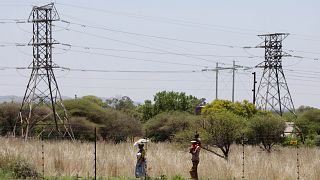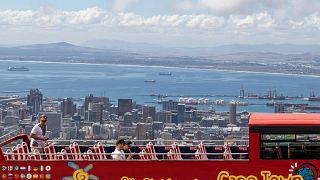South Africa
This area looked like a desert four years ago. At the time, Cape Town faced the most severe drought in its history - and the Theewaterskloof Dam was dry. Today, city water stocks are close to their maximum capacity.
But behind these mountains, in the city’s biggest and poorest township Khayelitsha, water is still a scarce commodity.
Shadrack Mogress is stocking up in preparation for the next water cut. He always keeps this 100-litre drum full in case the tap runs dry.
“It is actually worse! Because we knew, at that time, we knew that we’re sitting with a problem, a water problem. But it is actually worse, because we do have water and we know that. But it happens worst that it happened when there was a drought" complained Shadrack Mogress, a resident in Khayelitsha.
The only water points in settlements like this one are the ones attached to toilets built by the city authorities.
And when one goes dry, they walk until they find the next working lavatory.
“We have no choice but to wake up in the morning and try to fill your bucket as much as possible" said Sandile Zatu, another Khayelitsah resident.
The township is home to hundreds of thousands of people. Every week their number grows with new arrivals from the countryside looking for a better life in Cape Town.
The city says it’s simply too difficult to keep up with the constant influx.
“During the period of Covid 19 at least 17 new illegal informal settlements have been erected across our city in the space of a few months. Seventeen new illegal informal settlements. And the city then is expected to provide basic services to those settlements which is difficult to do", admits Zahid Badroodien representing the City of Cape Town authorities.
But internal migration is only partly the issue, according to Professor Jo Barnes, a community health expert at the University of Stellenbosch.
“Part of that is outside the control of the city but this has been going on for the last 30 years and I’ve actually seen very little forward planning to cope with these people. It seems to me, and I hope I’m not attributing something to them, but it seems to me as if they thought if they just leave it alone and let them settle where they were, and it is unpleasant that they will go back", claims community health expert Jo Barnes.
South Africa is the world’s most unequal country, according to a new World Bank report.
Ageing infrastructure and an increase in droughts expected over climate change will put further pressure on future water supply in Cape Town.
Those who are likely to suffer the most will be the city’s poor.













01:07
Only 35% of sustainable development goals on track to meet target, UN says
02:30
Morocco’s oases struggle to survive amid growing desertification
Go to video
Semenya ruling shakes foundations of gender rules in sport
01:53
SMES under pressure as business confidence hits four-year low in South Africa